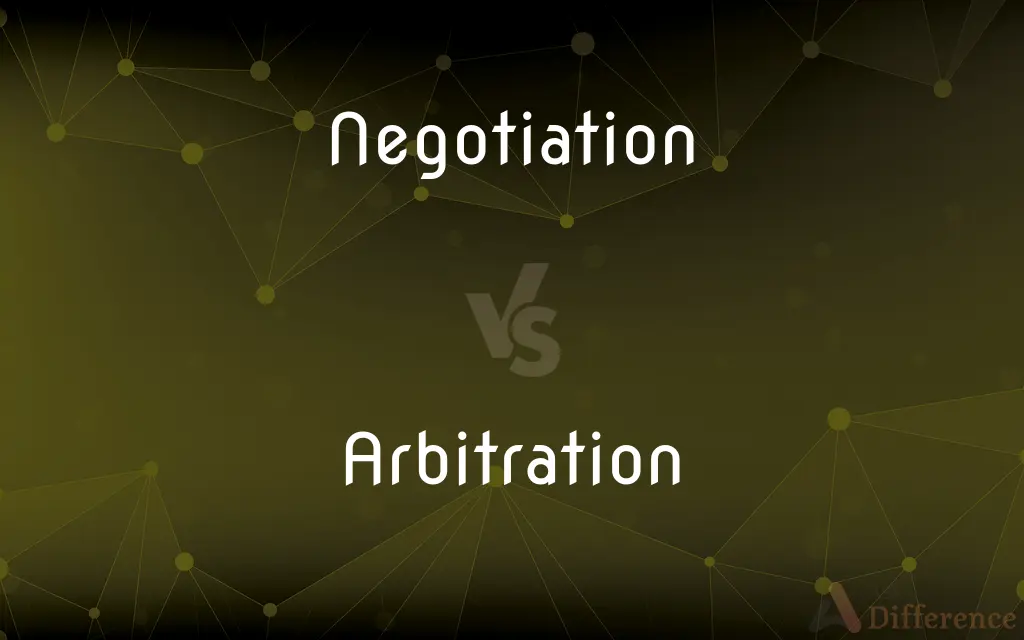Negotiation vs. Arbitration — What's the Difference?
By Tayyaba Rehman & Urooj Arif — Updated on May 5, 2024
Negotiation involves voluntary, direct discussions between parties to reach a mutual agreement, while arbitration entails a neutral third-party making binding decisions to resolve disputes.

Difference Between Negotiation and Arbitration
Table of Contents
ADVERTISEMENT
Key Differences
Negotiation is a voluntary process where parties directly engage to discuss their differences and try to reach a mutual agreement based on their interests. This process is flexible, allowing parties to control the outcome. Whereas, arbitration involves a third party, known as an arbitrator, who listens to both sides and then makes a decision that is usually binding on all parties involved.
Negotiations can be informal and do not necessarily require the parties to follow specific procedures or rules. This flexibility can lead to creative solutions tailored to the needs of both parties. On the other hand, arbitration is more formal and follows specific legal procedures, which can make the process less flexible but ensure a legally binding resolution.
In negotiation, the parties retain control over the outcome. They can decide the terms of any agreement and are not bound until they reach a consensus. In contrast, in arbitration, the control shifts to the arbitrator who decides the outcome, and the parties are bound by the arbitrator's decision.
Negotiation usually does not involve third parties unless mediators are brought in to facilitate dialogue. This can make negotiation a more private and less costly affair. However, arbitration necessarily involves an arbitrator who can incur costs for the parties and whose involvement makes the process more formal.
Negotiations can continue for an indefinite period as long as the parties are willing to keep talking, which can be beneficial or detrimental depending on the urgency and nature of the dispute. Arbitration, however, typically follows a more structured timeline, leading to faster resolutions but potentially less thorough exploration of issues compared to negotiation.
ADVERTISEMENT
Comparison Chart
Definition
Direct discussions to reach agreement
Third-party decision-making process
Formality
Informal and flexible
Formal and procedural
Control over Outcome
High (parties decide)
Low (decided by arbitrator)
Involvement of Third Party
Optional (mediators)
Required (arbitrator)
Binding Nature
Non-binding until agreement
Binding decision
Compare with Definitions
Negotiation
A bargaining process between two or more parties seeking to discover a common ground.
The negotiation lasted for several hours, but eventually, all parties agreed on the terms.
Arbitration
The process by which parties submit their dispute to an appointed authority for a decision.
The arbitration panel delivered their decision within weeks.
Negotiation
The art of making deals through dialogue.
Good negotiation skills can lead to better outcomes in both business and personal disputes.
Arbitration
A legal technique for the resolution of disputes outside the courts.
The contract specifies that any disputes will be settled by arbitration.
Negotiation
Process of discussing something with someone to reach an agreement.
The company and employees went into negotiation to improve working conditions.
Arbitration
A method of dispute resolution involving one or more arbitrators who decide the dispute.
They agreed to submit the dispute to binding arbitration.
Negotiation
A strategic discussion that resolves an issue in a way that both parties find acceptable.
Through careful negotiation, both sides compromised and reached a satisfactory agreement.
Arbitration
A formal alternative to litigation.
Many businesses prefer arbitration for resolving contractual disputes quickly.
Negotiation
A method of resolving disagreements between parties.
Negotiation is preferred as it often preserves the relationship between the disputing parties.
Arbitration
The act of having a third party review the evidence in a dispute and impose a decision that is legally binding.
Arbitration is often faster than going through court.
Negotiation
Negotiation is a dialogue between two or more people or parties intended to reach a beneficial outcome over one or more issues where a conflict exists with respect to at least one of these issues. Negotiation is an interaction and process between entities who aspire to agree on matters of mutual interest, while optimizing their individual utilities.
Arbitration
Arbitration, a form of alternative dispute resolution (ADR), is a way to resolve disputes outside the judiciary courts. The dispute will be decided by one or more persons (the 'arbitrators', 'arbiters' or 'arbitral tribunal'), which renders the 'arbitration award'.
Negotiation
Discussion aimed at reaching an agreement
A worldwide ban is currently under negotiation
Negotiations between unions and employers
Arbitration
The use of an arbitrator to settle a dispute
Tayside Regional Council called for arbitration to settle the dispute
Binding arbitration
Negotiation
The action or process of transferring legal ownership of a document.
Arbitration
The process by which the parties to a dispute submit their differences to the judgment of an impartial person or group appointed by mutual consent or statutory provision.
Negotiation
The act or process of negotiating
Successful negotiation of a contract.
Entered into labor negotiations.
Arbitration
The act or process of arbitrating.
Negotiation
The transfer of a negotiable instrument.
Arbitration
A process through which two or more parties use an arbitrator or arbiter in order to resolve a dispute.
Negotiation
The process of achieving agreement through discussion.
The specifics of the contract are still under negotiation.
The two parties entered into negotiations about the merger.
Arbitration
In general, a form of justice where both parties designate a person whose ruling they will accept formally. More specifically in Market Anarchist (market anarchy) theory, arbitration designates the process by which two agencies pre-negotiate a set of common rules in anticipation of cases where a customer from each agency is involved in a dispute.
Negotiation
The act or process of negotiating; a treating with another respecting sale or purchase. etc.
Arbitration
The hearing and determination of a cause between parties in controversy, by a person or persons chosen by the parties.
Negotiation
Hence, mercantile business; trading.
Who had lost, with these prizes, forty thousand pounds, after twenty years' negotiation in the East Indies.
Arbitration
(law) the hearing and determination of a dispute by an impartial referee agreed to by both parties (often used to settle disputes between labor and management)
Negotiation
The transaction of business between nations; the mutual intercourse of governments by diplomatic agents, in making treaties, composing difference, etc.; as, the negotiations at Ghent.
An important negotiation with foreign powers.
Arbitration
The act of deciding as an arbiter; giving authoritative judgment;
They submitted their disagreement to arbitration
Negotiation
A discussion intended to produce an agreement;
The buyout negotiation lasted several days
They disagreed but kept an open dialogue
Talks between Israelis and Palestinians
Negotiation
The activity or business of negotiating an agreement; coming to terms
Common Curiosities
What is the main difference between negotiation and arbitration?
Negotiation is a direct, voluntary process between parties seeking mutual agreement, while arbitration involves a third party making a binding decision.
Is arbitration always legally binding?
Yes, decisions made in arbitration are generally binding and enforceable by law.
Can negotiation include third parties?
Yes, third parties such as mediators can facilitate negotiation but are not essential to the process.
Can the outcome of arbitration be appealed?
Generally, the decision in arbitration is final and cannot be appealed, unlike court decisions.
How does the cost compare between negotiation and arbitration?
Negotiation is generally less costly than arbitration, which can involve fees for the arbitrator and other legal expenses.
Can either party withdraw from negotiation?
Yes, parties can withdraw from negotiation at any time as it is a voluntary process.
Which is typically faster, negotiation or arbitration?
Arbitration is usually faster as it follows a more structured process compared to the potentially prolonged discussions in negotiation.
Which process gives more control to the parties involved?
Negotiation allows more control for the parties over the outcome as opposed to arbitration where the arbitrator has the final say.
Is arbitration considered a form of ADR (Alternative Dispute Resolution)?
Yes, arbitration is a key form of ADR, providing an alternative to traditional court litigation.
What role does an arbitrator play in the arbitration process?
The arbitrator acts as a judge, listening to all sides and making a binding decision based on the evidence and arguments.
Are there any confidentiality differences between negotiation and arbitration?
Both processes are generally private, but arbitration can sometimes involve public records unless specifically agreed upon as confidential.
What skills are important for effective negotiation?
Key skills include communication, persuasion, and the ability to compromise.
What are the advantages of arbitration over traditional court litigation?
Advantages include quicker resolutions, lower costs compared to prolonged court cases, and privacy.
In what scenarios is negotiation preferred over arbitration?
Negotiation is preferred when parties seek to maintain a relationship or need a flexible solution tailored to their needs.
Does arbitration require an agreement to arbitrate?
Yes, parties must agree to arbitrate either before or after a dispute arises, typically through a contractual clause.
Share Your Discovery

Previous Comparison
Scavenger vs. Decomposer
Next Comparison
Fate vs. CoincidenceAuthor Spotlight
Written by
Tayyaba RehmanTayyaba Rehman is a distinguished writer, currently serving as a primary contributor to askdifference.com. As a researcher in semantics and etymology, Tayyaba's passion for the complexity of languages and their distinctions has found a perfect home on the platform. Tayyaba delves into the intricacies of language, distinguishing between commonly confused words and phrases, thereby providing clarity for readers worldwide.
Co-written by
Urooj ArifUrooj is a skilled content writer at Ask Difference, known for her exceptional ability to simplify complex topics into engaging and informative content. With a passion for research and a flair for clear, concise writing, she consistently delivers articles that resonate with our diverse audience.
















































